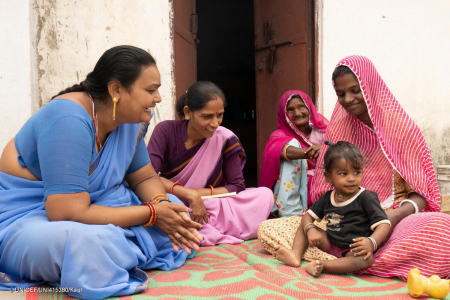You are here
Strengthening the Social Service Workforce for Family-Based Care: Learning from Young People with Lived Experience of Care

The Global Social Service Workforce Alliance, Child Frontiers and Martin James Foundation are delighted to announce an innovative new project beginning this year. This multi-national, multi-year project will work to learn from and amplify the knowledge and expertise of young adults with lived experience of care, their families, and social workers serving vulnerable children worldwide to develop a range of new training and advocacy tools for the social service workforce.
This project comes at a crucial time in history as nations are growing in the recognition of the value of family for every child’s development and well-being. This has led many to adopt new laws and policies to prevent the separation of children from their families and ensure family-based alternative care options are available when necessary. To ensure the social service workforce worldwide is ready to meet the requirements set forth in these new laws and policies, this project looks to learn directly from young adults with lived experience of care. Our hope is their expertise, insight, and knowledge will strengthen, deepen, and sustain the motivation and competencies of the social service workforce.
While research indicates the central role family plays in the healthy development of every child, many countries throughout the world still rely primarily upon residential care to provide alternative care for children. Millions of children are, therefore, growing up in residential care or are currently at risk of being separated for long periods of time from their families and communities.
As the first line of response for many children and families at risk of separation, a well-developed and supported social service workforce plays an essential role in helping countries achieve lasting family-based care solutions. It is critical to ensure that these social workers, paraprofessionals and community volunteers are well-resourced, trained and equipped to ensure that children are not unnecessarily separated from their original family and returned to their families and supported when separation has occurred. Further, when children do require alternative care, it is critical that the social service workforce be equipped to ensure that every child receives high-quality, family-based care through kinship care, foster care, or adoption.
This project aims to enhance this workforce’s skill set by turning directly to young people with lived experience of care. Implemented in Brazil, India and Uganda, the project will begin by documenting the knowledge and perspective of those with care experience through videos, written testimonies and other creative media. Expertise gathered will inform a series of training and advocacy tools in each country. The training tools will aim to enhance the knowledge, resources and practices of social service workers as they are increasingly motivated by and skilled in prioritizing family strengthening and family-based alternative care. The advocacy tools will aim to raise awareness of the crucial role of social service workers in supporting governments to reform care systems and of the need to increase long-term investment in this essential workforce, covering not only adequate salaries and resources, but the resources required to build and incentivize continuous professional development and supervision.
“Incorporating the knowledge and experiences of care-experienced youth, family members, and practitioners is crucial in shifting policies and workforce practices away from a reliance on residential care, ” says Hugh Salmon, Director of the Global Social Service Workforce Alliance. “The perspectives of those with lived experience can guide the creation of more effective alternative care models centred on the needs and wishes of the child and on empowering families to provide good care for their children. This will enable a more responsive and empathetic approach to protecting children who might otherwise be at risk of losing the care of a family.”
“As we aim to be led by young adults with lived experience of care, we are really pleased to be collaborating with the Global Social Service Workforce Alliance and Child Frontiers. We celebrate the fundamental importance of social workers and the pivotal difference they make in the lives of children and families. When they have the best, evidence-informed tools and resources available, children and families greatly benefit,” said Ailsa Laxton, Director of Global Programmes at Martin James Foundation.
Stay tuned for more information as this two-year project unfolds.

